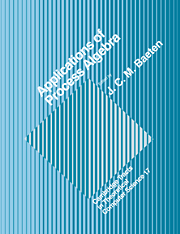Book contents
- Frontmatter
- Preface
- Contents
- An introduction to process algebra
- Two simple protocols
- Proving mutual exclusion with process algebra
- Process algebra as a tool for the specification and verification of CIM-architectures
- A process creation mechanism in process algebra
- Correctness proofs for systolic algorithms: palindromes and sorting
- Verification of an algorithm for log-time sorting by square comparison
- On the Amoeba protocol
- Process algebra semantics of POOL
- Some observations on redundancy in a context
- A modular approach to protocol verification using process algebra
- Index of concepts
- Index of names
- Index of symbols and notation
Preface
Published online by Cambridge University Press: 03 December 2009
- Frontmatter
- Preface
- Contents
- An introduction to process algebra
- Two simple protocols
- Proving mutual exclusion with process algebra
- Process algebra as a tool for the specification and verification of CIM-architectures
- A process creation mechanism in process algebra
- Correctness proofs for systolic algorithms: palindromes and sorting
- Verification of an algorithm for log-time sorting by square comparison
- On the Amoeba protocol
- Process algebra semantics of POOL
- Some observations on redundancy in a context
- A modular approach to protocol verification using process algebra
- Index of concepts
- Index of names
- Index of symbols and notation
Summary
In this book, we give applications of the theory of process algebra, known by the acronym ACP (Algebra of Communicating Processes), as it has been developed since 1982 at the Centre for Mathematics and Computer Science, Amsterdam (see), since 1985 in cooperation with the University of Amsterdam and the University of Utrecht. An important stimulus for this book was given by the ESPRIT contract no. 432, An Integrated Formal Approach to Industrial Software Development (Meteor). The theory itself is treated in, which will be revised, translated and published in this series. The theory is briefly reviewed in the first article in this book, An introduction to process algebra, by J.A. Bergstra and J.W. Klop.
This book gives applications of the theory of process algebra. By the term process algebra we mean the study of concurrent or communicating processes in an algebraic framework. We endeavour to treat communicating processes in an axiomatic way, just as for instance the study of mathematical objects as groups or fields starts with an axiomatization of the intended objects. The axiomatic method which will concern us, is algebraic in the sense that we consider structures which are models of some set of (mostly) equational axioms; these structures are equipped with several operators. Thus we use the term ‘algebra’ in the sense of model theory.
- Type
- Chapter
- Information
- Applications of Process Algebra , pp. v - xPublisher: Cambridge University PressPrint publication year: 1990

